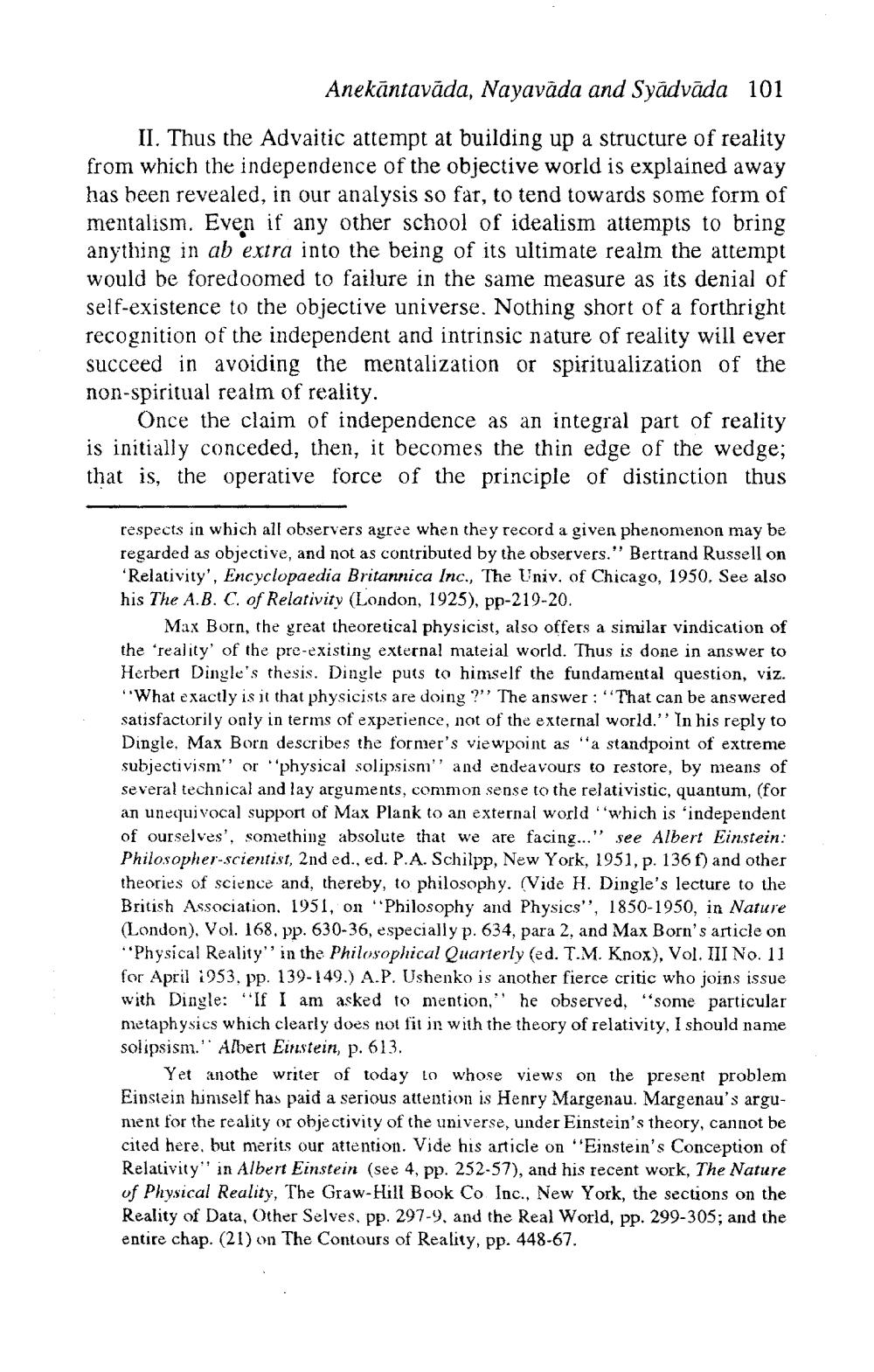________________
Anekāntavāda, Nayavāda and Syâdvāda 101
II. Thus the Advaitic attempt at building up a structure of reality from which the independence of the objective world is explained away has been revealed, in our analysis so far, to tend towards some form of mentalism. Even if any other school of idealism attempts to bring anything in ab extra into the being of its ultimate realm the attempt would be foredoomed to failure in the same measure as its denial of self-existence to the objective universe. Nothing short of a forthright recognition of the independent and intrinsic nature of reality will ever succeed in avoiding the mentalization or spiritualization of the non-spiritual realm of reality.
Once the claim of independence as an integral part of reality is initially conceded, then, it becomes the thin edge of the wedge; that is, the operative force of the principle of distinction thus
respects in which all observers agree when they record a given phenomenon may be regarded as objective, and not as contributed by the observers." Bertrand Russell on "Relativity', Encyclopaedia Britannica Inc., The Univ. of Chicago, 1950. See also his The A.B. C. of Relativity (London, 1925), pp-219-20.
Max Born, the great theoretical physicist, also offers a similar vindication of the 'reality of the pre-existing external mateial world. Thus is done in answer to Herbert Dingle's thesis. Dingle puts to himself the fundamental question, viz. "What exactly is it that physicists are doing?'' The answer : "That can be answered satisfactorily only in terms of experience, not of the external world." In his reply to Dingle, Max Born describes the former's viewpoint as "a standpoint of extreme subjectivism" or "physical solipsismi'' and endeavours to restore, by means of several technical and lay arguments, common sense to the relativistic, quantum, (for an unequivocal support of Max Plank to an external world which is 'independent of ourselves', something absolute that we are facing..." see Albert Einstein: Philosopher-scientist, 2nd ed., ed. P.A. Schilpp, New York, 1951, p. 136f) and other theories of science and, thereby, to philosophy. (Vide H. Dingle's lecture to the British Association, 1951, on Philosophy and Physics", 1850-1950, in Nature (London), Vol. 168. pp. 630-36, especially p. 634, para 2, and Max Born's article on **Physical Reality'' in the Philosophical Quarterly (ed. T.M. Knox), Vol. III No. 11 for April 1953, pp. 139-149.) A.P. Ushenko is another fierce critic who joins issue with Dingle: "If I am asked to mention," he observed, "some particular metaphysics which clearly does not fit in with the theory of relativity, I should name solipsism." Albert Einstein, p. 613.
Yet anothe writer of today to whose views on the present problem Einstein himself has paid a serious attention is Henry Margenau. Margenau's argument for the reality or objectivity of the universe, under Einstein's theory, cannot be cited here, but merits our attention. Vide his article on "Einstein's Conception of Relativity" in Albert Einstein (see 4, pp. 252-57), and his recent work, The Nature of Physical Reality, The Graw-Hill Book Co Inc., New York, the sections on the Reality of Data, Other Selves, pp. 297-9, and the Real World, pp. 299-305; and the entire chap. (21) on The Contours of Reality, pp. 448-67.




